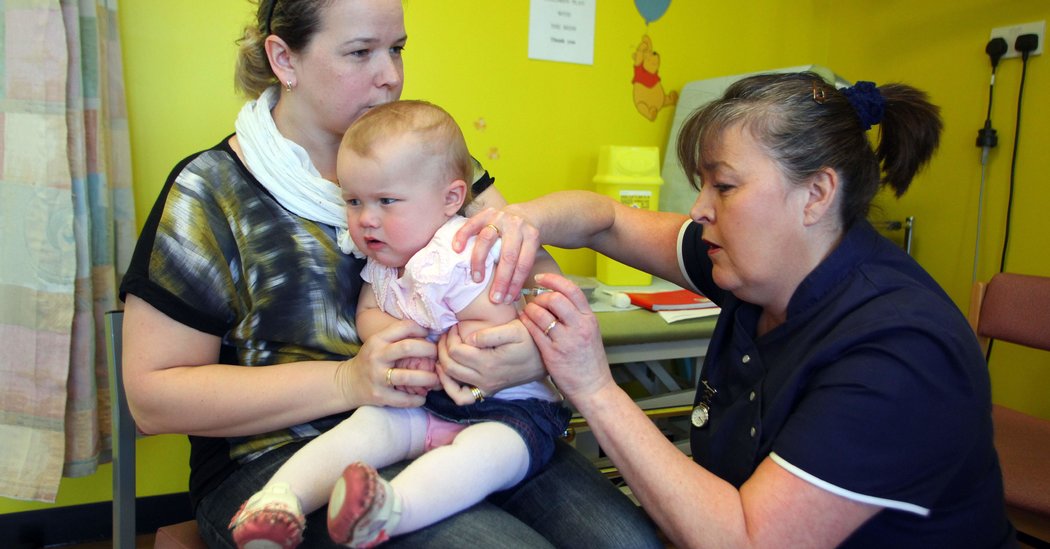
LONDON — Measles has returned to four European countries this year amid a “dramatic resurgence” in the disease on the continent, the World Health Organization said on Thursday, a reversal fueled in part by a rising wave of people who are refusing to be vaccinated.
The number of cases in the first half of the year in the European region doubled in comparison with 2018 — with 90,000 people infected, compared with 44,175 in the first six months of last year, the W.H.O. said in a statement.
“We are backsliding; we are on the wrong track,” Dr. Kate O’Brien, the director of the W.H.O.’s immunization department, said at a news conference.
The W.H.O. monitors the elimination of the disease across the region, and countries with continuous transmission of the virus for 12 consecutive months are no longer considered measles-free.
Albania, Britain, the Czech Republic and Greece, which had declared measles eliminated, joined 12 other nations — including France, Germany, Poland, Romania and Russia — where the disease is endemic, the W.H.O. said.
Even countries that had eliminated the disease have seen a return of infections. The United States is experiencing the worst measles outbreak in decades, with a record number of cases since the last large epidemic, in 1992, and since measles was declared eliminated in 2000, according to the Centers for Disease Control and Prevention.
“Elimination” does not mean that the disease is completely absent. It indicates that a country has gone more than 12 months without continuous disease transmission. That is why health experts have called on people to continue to vaccinate children.
But a growing movement promoting skepticism of the vaccine — mainly because of the belief, which scientists have argued against, that it could cause autism in children — has contributed to falling vaccination rates in many developed nations, and the shots are not compulsory everywhere.
In many countries, like the United States, vaccination rates are higher than 90 percent, and globally, 86 percent of children had received at least one dose of measles vaccine by the end of 2018, according to the W.H.O.
The disease is one of the most highly infectious, and because of this, 93 percent to 95 percent of a population must be immune to achieve herd immunity — meaning that the number of people with vaccines mingling with vulnerable individuals can help prevent the spread of the disease.
Symptoms are initially similar to those of a cold, but can soon develop into high fever and telltale red dots on the body. Treatment is available only for the symptoms, and the disease can lead to complications like eye infections and brain infections.
The disease is preventable, however, and the vaccine offered to children has been shown to be extremely safe and efficient, medical experts say.
The four countries where the disease has had a resurgence are now considered among the highest-priority areas and will receive support, Dr. Dragan Jankovic, the technical officer for vaccine-preventable diseases and immunization at the W.H.O.’s regional office for Europe, said in a telephone interview on Thursday.
Dr. Jankovic said their new status was an alarm bell that if other countries are not vigilant against the disease, “they will lose what they have achieved.”
In 2017-18, vaccine coverage declined in a majority of diseases for babies and young children in England. Coverage for the combine measles, mumps and rubella, or MMR, vaccine was 91.2 percent, the lowest in nearly a decade.
In Britain, the government had responded with a prevention drive even before the W.H.O. statement was released.
The government announced new measures to tackle the current outbreak and to improve immunization, working with family doctors, addressing parents’ concerns about vaccines and calling a summit meeting of social media companies to discuss promoting accurate information about vaccines.
“Losing our ‘measles-free’ status is a stark reminder of how important it is that every eligible person gets vaccinated,” Dr. Mary Ramsay, the head of immunization at Public Health England, said in a statement on Sunday. “Elimination can only be sustained by maintaining and improving coverage of the MMR vaccine.”

